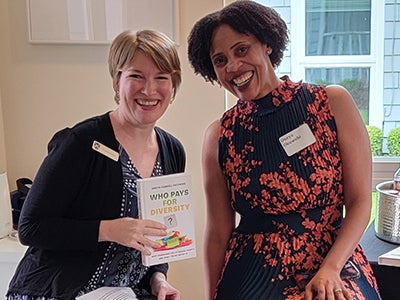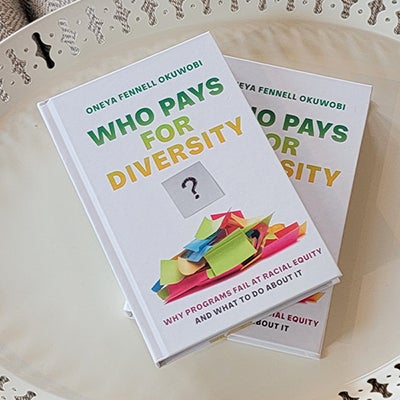
The Boniuk Institute's Religion and Public Life Center hosted University of Cincinnati sociologist Oneya Fennel Okuwobi at a Religious and Civic Leader Gathering to discuss the costs of diversity efforts in religious organizations. In the past 20 years, she says there has been a remarkable movement in the Christian church towards racial diversity. But when there is a high level of expectation and there is a gap between expectation and reality, there is a lot of space for hurt and damage.
Okuwobi's research mainly investigates Christian churches, and a clear pattern has emerged. Clergy of color feel constrained and stressed by their experiences as the "face of diversity" in their organizations. In fact, fully 9 oof 10 clergy of color Okuwobi interviewed in her research reported physical and mental symptoms of stress and anxiety.
Okuwobi finds that there are four costs to clergy of color
- They experience a significantly heavier workload. They have their job to do, but also the job of representing diversity to and on behalf of their organization. This requires time, energy, and personal resources from the clergy member.
- As a "diversity hire," the legitimacy of their education, their skills, their contributions, and their potential is threatened.
- Reduced to a "diversity hire," personal legitimacy becomes an issue. Clergy of color do not feel like a full member of their organization and question their own worth as a professional and community member.
- Being the face of diversity in a (primarily white) organization means that clergy of color have to be discernible non-White enough to be diverse, but not diverse enough to make the white population uncomfortable. Many report feeling a loss of personal identity.
"When you smack diversity on top of a foundation that's build, it doesn't work," Okuwobi said. "Any time you build off of the existing foundation, you build something flawed." Real change must include the foundations; otherwise, you will just reinforce the status quo.
Diversity in church leadership works when the clergy of color are not just valued for the skin-deep diverse skills that they bring, but for their leadership and their contribution to the community. There must also be a commitment from the community to not just outsource "diverse stuff" to the clergy of color, but to encourage diverse congregants and community members to feel fully immersed in the faith.
When asked what kind of change she would like to see, Okuwobi responded "We need a collective citizenship to make change. I want people to stop accepting jobs which put them in the position of being the face of color; jobs which are ultimately doing them harm. When people accept these jobs, they legitimize institutions for the way that they are. Individuals need to say that 'I no longer have a desire to be a part of this'."
Her advice for working towards successful diversity in religious organizations is to fight for the right things. There is a tendency to beat around the bush; to speak politely so that no one gets offended. The problem is, that nothing gets said. These times require people to not be afraid of complication and conflict; to be honest about what is right and what is wrong. Also, Okkuwobi urges a focus on justice; i.e. fairness in process, outcomes, and practice. Justice at the organizational level requites you to recognize the unfairness sin the existing processes and allows you to understand what is necessary to allow everyone to succeed. Justice means going beyond the compromise of a middle ground.

